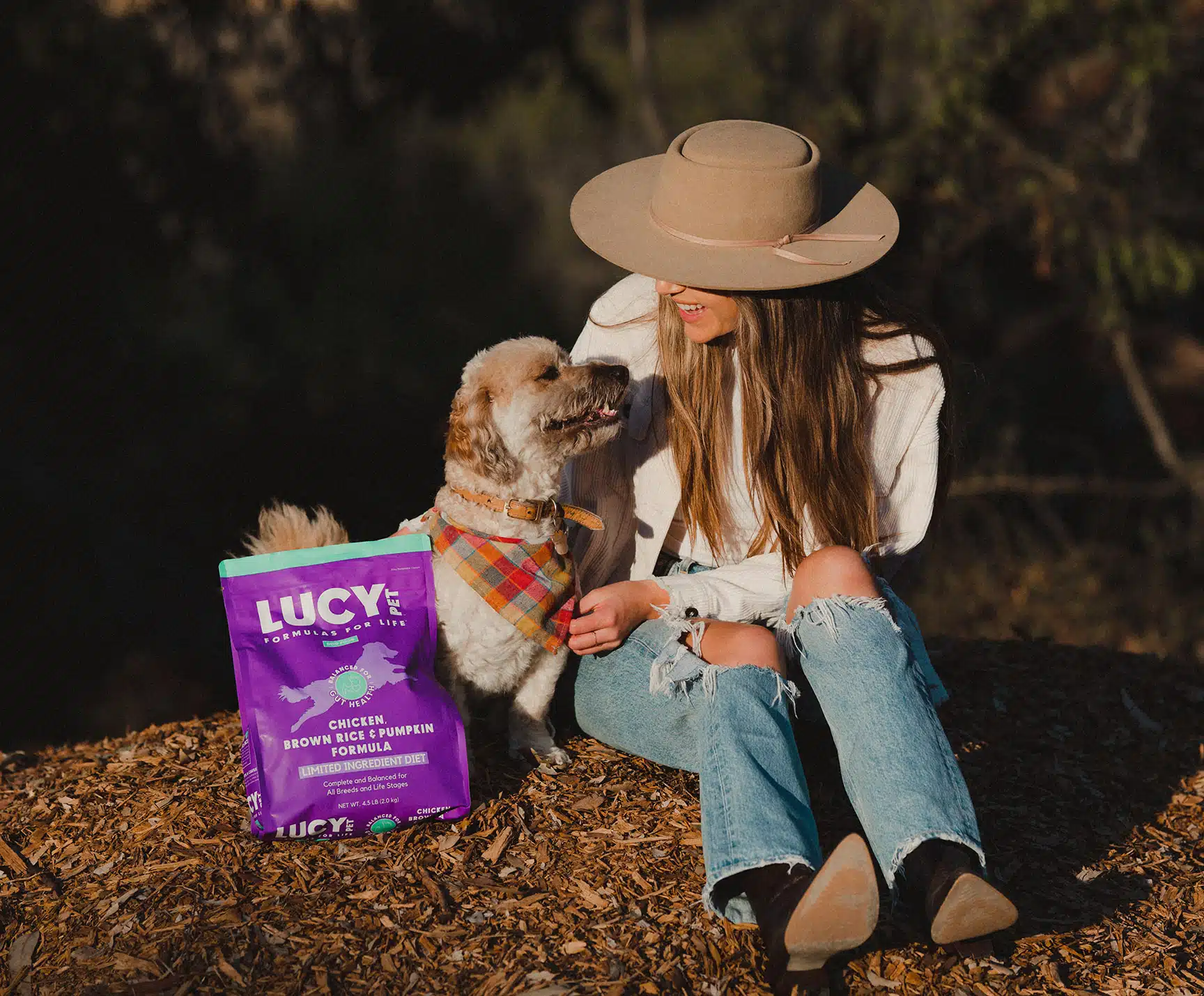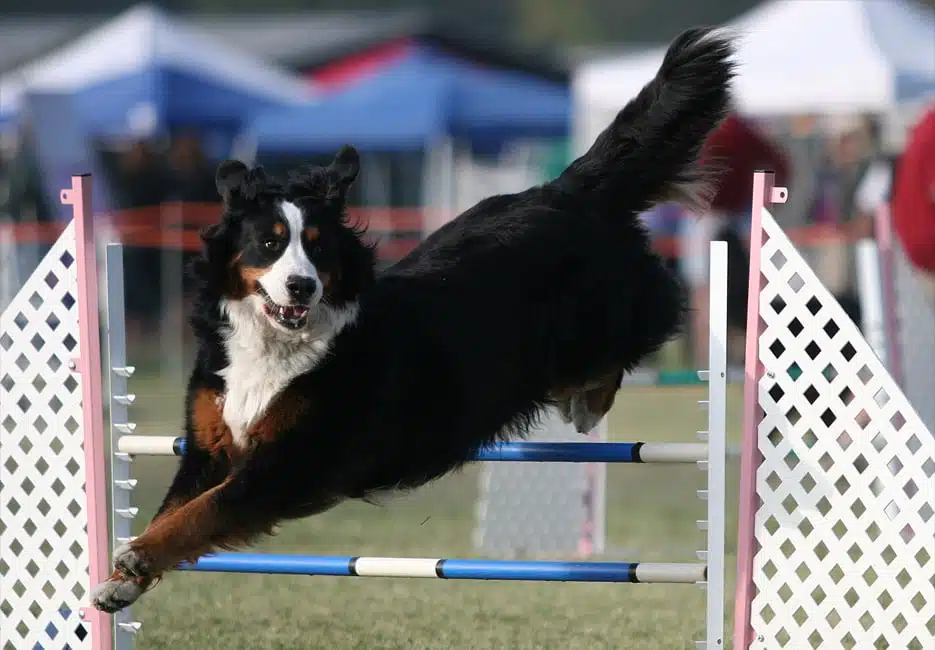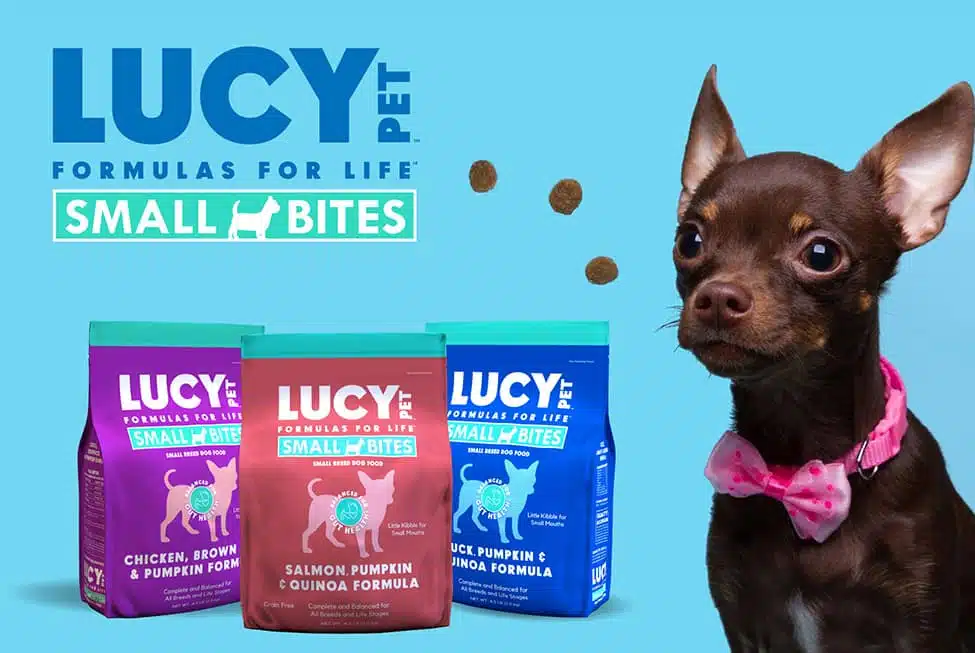5 Most Common Poodle Health Issues
Poodles are generally considered to be a very sturdy breed with few health issues. Their life expectancy ranges from 10-18 years. Through the long history of genetically breeding calm, compassionate, and intelligent dog, most Poodles live a perfectly healthy long life.
Poodles not only have fabulous hairdos, but they also excel in agility dog-sport activities. Standard, Miniature, and Toy Poodles are always a favorite at dog shows and usually place well in judging.
One official list ranks Poodles as the second most intelligent dog breed (what do they know, as far as we’re concerned Poodles is #1). Don’t get us wrong, border collies are clever and cute doing tricks, but it is hard to beat a poodle’s intelligence when you live with one. Any poodle person will agree that poodles are easy to train using the usual techniques of repetition, patience, and rewards. When done correctly, there are almost no limits to what poodles can learn. Poodles enjoy learning new tricks and are great with people and other pets.
With all these qualities, it’s no wonder so many families have Poodles. If you’re thinking of adding a Poodle to your life or if you currently have one, it is important to be aware of health issues that a Poodle may encounter. Like any dog, there are potential health risks. Knowing the five most common Standard Poodle health issues will help you be adequately prepared should any problems arise.
1. Bloat
Bloat occurs when gas gets trapped inside a dog’s stomach. The stomach twists as much as 180 degrees, stopping the flow of digestion and causing the gas to build up pressure. It’s an incredibly painful disorder with a 20% mortality rate even with surgical intervention. Deep-chested breeds like the standard Poodle or Great Dane are especially prone to experiencing bloat.
Another name for bloat is gastric dilatation and volvulus, or GDV. Gastric dilatation is the build-up of pressure and expansion of the stomach. Volvulus is the twisting motion that commonly follows. GDV is one of the most severe poodle health problems due to how quickly it arises and how difficult it is to intervene.
Symptoms of Bloat
When Poodles are experiencing bloat, owners have to react quickly. This condition will become life-threatening within hours if the gas does not naturally pass. And if the twisting reaches that full 180-degree mark, surgical intervention is unlikely to save the dog.
Knowing the symptoms beforehand can help you identify this problem before it’s too late. Those symptoms include:
- Sudden distress
- Vomiting motions that produce nothing
- Expanded and firm stomach (like a hard, tight balloon)
- Pacing and panting
- Excessive drooling
- Restlessness
If your Poodle is acting erratic and has an enlarged stomach, know that you have minutes to respond. Getting to the vet in time for surgical intervention is one of the only ways to relieve the pressure and save their life.

https://pixabay.com/photos/standard-poodle-puppy-brown-dog-1549558/
Tips for Prevention
In theory, the gas trapped inside the digestive tract comes from gulping air while eating and the process of breaking down food. If either of these sources causes air to become trapped, bloat will occur.
- Gastropexy (Stomach Tack)– Gastropexy is a proactive laparoscopic procedure that permanently attaches the dog’s stomach to the abdominal wall. This prevents the stomach from “twisting” and causing a GDV (Gastic Dilation and Volvulus).
- Limit running after meals– It is a good idea to limit excessive running immediately after eating. The theory is that a full stomach of undigested food could twist more easily if your dog is running at top speeds. So a best practice is to discourage any high-energy activity for 30-45 minutes after eating.
- Smaller meals throughout the day – Try offering your pup smaller meals throughout the day instead of one or two large meals. Although this might cause them to defecate multiple times each day, this is better than dealing with bloat. By breaking up the meals, less air can be ingested, thus reducing the risk.
- Leaving the food bowl on the floor – Some pet owners suggest raising your dog’s food bowl to ease the flow of digestion and reduce the amount of air intake. This recommendation, however, has never proven to work. In fact, one study found that the opposite might be true.
2. Addison’s Disease
A less deadly, but equally common health concern for Poodles is Addison’s disease. Addison’s is denoted by defective adrenal glands. Poodles typically have a relaxed temperament by nature, but when their adrenal glands can’t produce normal levels of cortisol, this extra calm behavior can be a sign of Addison’s.
The underlying cause of Addison’s disease in Poodles is hard to pin down. This is primarily due to the number of ways the adrenal glands can be affected. Your dog’s immune system can suddenly begin attacking its own adrenal glands, or tumors can form on or around the gland. Certain medications and use of long-term steroids have been known to cause extensive damage to adrenal glands as well.
Symptoms of Addison’s
Confirming the right diagnosis as soon as possible can allow your pooch to return to their regular routine. Symptoms typically start around the age of four and can either develop over time or become suddenly apparent over a couple of days. Especially if it’s been a stressful time—like traveling or having celebrations multiple days in a row.
The symptoms of Addison’s disease are:
- Vomiting and canine diarrhea
- Lethargy and depression
- Lack of appetite
- Dehydration or excessive thirst
- Shaking
- Slow heart rate
Cortisol helps deal with stress, which means in stressful situations, you may notice the symptoms of Addison’s flare-up.
Living with Addison’s Disease
Among the list of standard Poodle health problems, Addison’s is the easiest to deal with. Treatment involves oral medication each day to help with the production of normal levels of hormones. Although Addison’s disease is incurable, your dog can lead a full and healthy life with the proper medication.
This, of course, all depends on receiving the right diagnosis. If your Poodle is acting strange and has any of the above symptoms, take them to the vet immediately for testing.
3. Thyroid Issues
Unfortunately, poodles may also be prone to developing thyroid issues at some point in their lives. As your dog ages, the number of health concerns always increases. Systems start to fail, certain vitamin or nutrient deficiencies cause damage, and they don’t recover from injury as quickly. One common concern in aging Poodles comes from their thyroid.
Hypothyroidism and hyperthyroidism are two diseases that involve the decreased or increased production of the thyroid hormone, thyroxine. Thyroxine is what regulates a dog’s metabolism. But the thyroid glands also support the proper function of the heart, liver, brain, and kidneys.
Hypothyroidism (the decreased production of thyroxine) is the likelier threat to a Poodle’s health. This can be caused by a tumor or when the immune system attacks the thyroid.
Symptoms of Hypothyroidism
As the thyroid starts to deteriorate a slow change will develop in your dog. Their behavior will change, and their capacity for physical activity will decrease. Both of these are also symptoms of an aging dog, making it hard to catch hypothyroidism.
In terms of behavioral changes, you might notice your Poodle change in the following ways.
- Sudden aggressive tendencies
- Head tilting
- Seizures
- Increased fatigue and naps
- Less interest in playtime
Other symptoms that could indicate your dog is sick include:
- Sudden weight gain
- Hair loss
- Itching (especially around the ear)
- Ear infections
- Wounds that won’t heal
Treatment
Whether you own toy, miniature, or standard poodles, all canines under this dog breed are susceptible to illnesses. Treating anything related to a hormonal imbalance typically implies medication for life. In order to restore balance to your Poodle’s health, they need the proper amounts of thyroxine for their metabolism and other organs to function. These hormone supplements can come in liquid or chewable forms and should be taken once per day.
If you suspect that your dog’s thyroid is in trouble, visit your local veterinarian to confirm the diagnosis. Never offer hormone supplements without a doctor’s recommendation.
4. Hip Dysplasia
A dog’s hip operates on a ball-and-socket joint. When the socket is over-or under-developed, or when the ligaments holding the two together are weak, the ball can become dislodged. This constant dislocation and relocation will wear down the joint’s integrity and cause hip dysplasia.
Older Poodles are the most commonly disaffected. However, young pups can develop early signs of hip dysplasia when they’re only five months old. This breed of dog has to be extra careful while exercising or partaking in strenuous activities.
Addison’s Disease in Poodles:
Causes of Diarrhea in Dogs:

https://unsplash.com/photos/Ya-CK-_v_ZE
Symptoms of Hip Dysplasia
Pet parents are quick to notice signs of hip dysplasia because of the obvious signs of pain that often arise. If your dog is walking strange or hesitates before joining in on playtime, it might be due to their hips. Here are some symptoms of early hip dysplasia.
- Hopping or limping on one side
- Slow to rise off the floor
- Only using front legs to stand up
- Refusal to climb stairs or walk uphill
Treatments and Prevention
There are three stages of treatment a dog can go through depending on how old they are and how severe the dysplasia is. For younger dogs who are still growing, extra rest and reduced activity might be all that’s needed to allow for the proper development of the hip joint.
Once the dog is older and has stopped growing, anti-inflammatories and pain medication might be coupled with bed rest to help reduce the amount of discomfort. Finally, if all else fails, surgery can be performed to replace the hip. This is the worst-case scenario and should only be considered when the pain hinders your dog’s quality of life.
Hip dysplasia is mostly genetic in Poodle mixes, which means if it’s going to occur, there’s almost nothing a dog owner can do to prevent it. However, if dysplasia is not certain, there are preventative measures.
- Keep your dog fit and at the proper weight relative to its size
- Hold off on strenuous exercise until the Poodle reaches adulthood
- If your dog is growing faster than average, keep exercise to a minimum and consult with your veterinarian.
5. Epilepsy
Epileptic seizures in dogs are as shocking for canines as they are for humans. Dogs will often seem confused or panicked about what’s happening, and the sight of your dog seizing can be terrifying to watch. When this happens, you need to remain calm and focus on helping your dog.
What to Do When Your Dog Has a Seizure
Never put your hand near your dog’s mouth when they are experiencing a seizure. It’s a common misconception that if you don’t, the dog might swallow their tongue and choke. This is untrue and has led to many unnecessary bites.
If your dog is suddenly seizing, there are a few things you can do to help.
- Turn off all bright lights and loud noises
- Move nearby objects away from your dog
- Place a pillow gently beneath their head
- Check the time and note how long the seizure lasts
- Stay nearby and remain calm
What You’ll Need to Report to the Veterinarian
Once the seizure is over, your dog might still be conscious and confused. It’s important to allow your dog a few minutes to recover before taking them to the veterinarian. However, if your dog is unconscious, call the vet to report what happened. They will ask you a few questions, so be sure you note the following:
- When the seizure started and how long it lasted
- Frequency of these seizures
- What your dog was doing prior
- Other symptoms occurring before or after the seizure, such as:
- Drooling
- Walking back and forth
- Stiff limbs
- Unresponsive or confused behavior
- Staring absently

https://unsplash.com/photos/_fEZvhwc6jI
Tips to Keeping Your Poodle Happy and Healthy
With any of these standard Poodle health issues, the best thing you can do to prevent these ailments is to offer a healthy, balanced life.
- Diet – Look for quality brands that offer superfoods like pumpkin, sweet potatoes, and salmon. Gut health is a huge determining factor in the breakdown and absorption of vital nutrients. To obtain a healthy gut biome, find food with prebiotic fiber. All Lucy Pet dog foods are precisely formulated to ensure a healthy coat, gut, heart, and mind.
- Exercise – Keeping your dog fit helps boost its immune system, and exercise benefits dogs mentally as much as it does physically. Take your dog on a walk every day and allow them to run around on weekends at dog parks.
- Regular Vet Visits – Don’t miss your regular checkup. Just like going to the dentist for humans, regular vet visits can ensure your dog is on track health-wise.
- Dental Care – Speaking of dentists, dental hygiene can help keep your dog’s mouth free from bacteria. And it will make their breath smell much more bearable.
- Worms, Ticks, and Fleas – After an outing, always be sure to check your dogs for ticks and fleas. To check for worms, look for white specks in their feces.
- Companionship – Don’t forget, Poodles are social creatures. They need adequate cuddle time and true companionship. Whether they are a toy Poodle or a Miniature Poodle, this breed of dog loves to be a part of the family and craves daily companionship.
Being a Poodle Owner
Poodles are incredible dogs. They’re receptive, playful, and easy to train. Doing a quick search online can show you the vast repertoire of tricks Poodles can learn. They’re calm dogs to have around small children and other pets, and they are not known to be territorial.
Like most dogs, Poodles have potential health issues to be aware of. While most are genetic, meaning they’re inevitable, some depend on the health of the dog. To give your Poodle the best chance at a happy, healthy life, be sure to provide them with the highest quality food they need to thrive.
Lucy Pet Products are created to fuel a healthy gut, strong muscles, and an intelligent mind—all of which fit the Poodle profile. If your dog is experiencing any health problems that make their stomachs sensitive, consider the limited ingredient products offered. This will give your dog’s diet the proper protein and vitamins they need while not upsetting their tummy.
To learn more interesting facts about Poodles and other helpful tips for pet parents, check out our blog at Lucy Pet today.
Sources:
Web MD. How Smart is your Dog? https://pets.webmd.com/dogs/features/how-smart-is-your-dog#1
Vets Now. GDV study using Vets Now data reveals 80% survival rate in dogs who undergo surgery https://www.vets-now.com/professionals/2017/09/22/vets-now-study-gdv-bloat-dogs/
NCBI. Non-dietary risk factors for gastric dilatation-volvulus in large and giant breed dogs. https://www.ncbi.nlm.nih.gov/pubmed/11128539
Prebiotic Fiber and Gut Health for Dogs: https://www.lucypetproducts.com/prebiotic-fiber-and-gut-health-for-dogs-and-cats
10 Interesting Facts About Poodles: https://www.lucypetproducts.com/10-interesting-facts-about-poodles







Leave A Comment
You must be logged in to post a comment.